NEWS
The faces of the FIFA World Cup Qatar 2022™ Vol.3 - Festival that entertains, attracts, and energises the people
21 December 2022
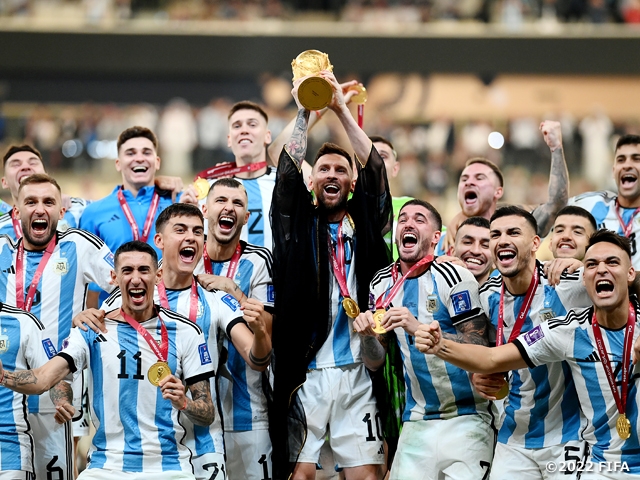
The FIFA World Cup Qatar 2022™, which lasted almost a month, ended on 18 December.
On this night, the jubilant Argentine supporters were singing and the players on the pitch were jumping up and down with big smiles on their faces at Lusail Stadium near Doha, after their hard-fought victory over the defending champions France.
Lionel MESSI, who led the team as captain in his fifth World Cup appearance, was named MVP of the tournament. It was Argentina's first World Cup win in 36 years since 1986, when the team was led by the late Diego MARADONA, and Messi appeared to be experiencing a range of emotions as he kissed the trophy during the ceremony.
The tournament, held for the first time in the Middle East, featured 64 matches at eight venues, mostly in the capital Doha, with a total of 3.4 million people, or an average of 53,000 per match, visiting the stadiums. The total number of visitors attending the fan festivals held during the tournament exceeded 1.8 million, with a daily average of approximately 70,000, but no major disruptions were reported until the very end of the event. The final day of the tournament coincided with Qatar's National Day, and as the tournament came to a close, the streets were decked out in holiday decor, enhancing the festive atmosphere. Football fans working in the hotels and shops also enjoyed picking the winning nation as they went about their daily tasks.
However, there was much turbulence on the pitch. The powerful teams that were thought to have been overwhelmingly superior in the group stage suffered successive losses, including Japan's impressive victories over World Cup champions Germany and Spain, Saudi Arabia's come from behind victory over Argentina, and Morocco's victory over Belgium and draw with Croatia. As a result, teams from the continental federations of Asia, Africa, Europe, and South America were represented in the knockout stage, implying a narrowing of the gap between each region.
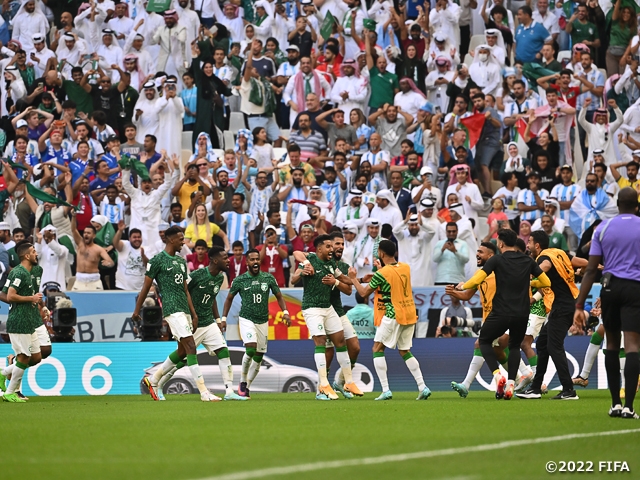
Morocco defeated Spain and Portugal to advance to the semi-finals, where they were defeated by France. In the third-place match, they faced Croatia, who had also defeated one of the tournament favourites, Brazil, in the quarterfinals, before losing to Argentina in the semi-finals. Although the African side finished fourth, they showcased a spectacular run in this tournament.
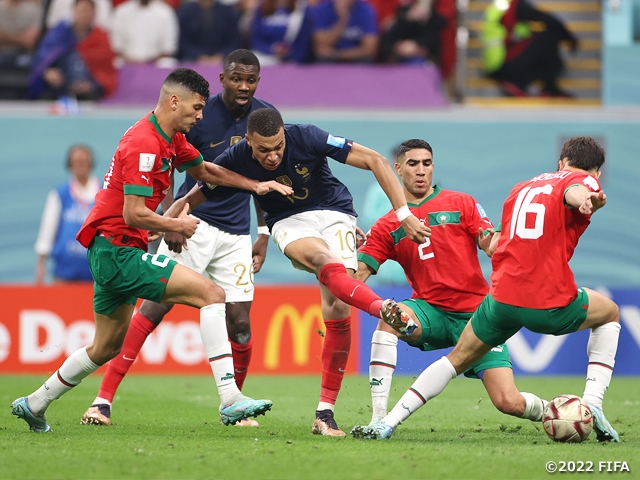
France, who were just one step away from defending their title, and Croatia, who finished second last time and third this time, have certainly made their presence felt.
This tournament set a new record in total goals scored, as the 172nd goal, which broke the previous record (171) set at the 2018 FIFA World Cup Russia™, was scored by French striker Kylian MBAPPE in the second half of extra time in the final. With this goal, Mbappe not only became the tournament's top scorer with eight goals, but also the first player to score a hat-trick in the World Cup final since England's Geoff HURST in 1966.
The FIFA Technical Study Group (TSG) presented a portion of its analysis, which showed that more goals were scored from cross-balls, making the presence of players capable of scoring goals in the penalty area more essential. Jurgen KLINSMANN of TSG noted that “Argentina and France were able to reach the final because they had players who could score in the box.” Like Mbappe for France, Messi scored seven goals for Argentina, including two in the final, along with his young sidekick Julian ALVAREZ, who also made his presence felt.
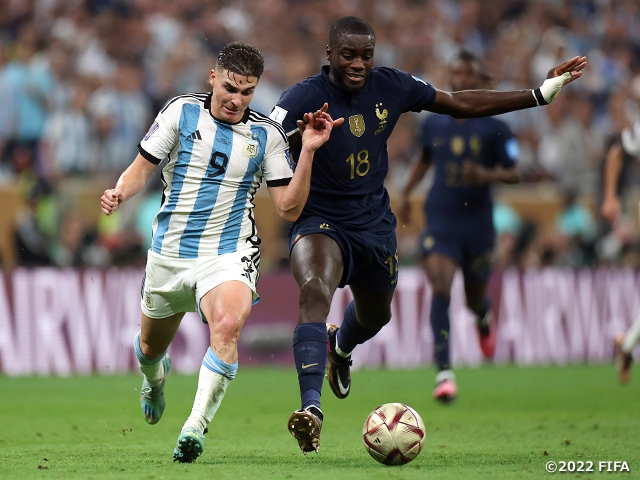
Arsene WENGER of TSG summed up the event as “an outstanding competition in terms of quality which made the whole thing very interesting and showed a lot of promise for the future.” FIFA President Gianni INFANTINO also praised it as “the best tournament ever.”
From 32 to 48 teams
The closing of the FIFA World Cup Qatar 2022™ also marks the end of the 32-team format. From the next edition in 2026, the number of teams will be expanded to 48, and each continental federation will have a different qualifying format to accommodate this expansion. The AFC will now have 8.5 slots instead of 4.5, and if it wins the intercontinental play-off, it could have up to nine. Canada, the USA, and Mexico will host the first World Cup in this new format. A Canadian journalist posed a question during this tournament. “What legacy did the 2002 FIFA World Cup Korea/Japan™ leave for Japan?” What the competition has to offer is a concern for the nations hosting the world event for the first time.
There was a scene I witnessed during this World Cup.
On the seafront close to the Doha city centre, there was a popular area for spectators and tourists that was decorated with bright lights and competition monuments and even had an event space available. When the sun went down, the flags of the countries corresponding to the tournament fixtures appeared on the surrounding buildings, and every day, the area was crowded with people strolling around in a festive atmosphere. In the corner next to this, there was a small open space, and one night before the semi-finals, this small space became a “stage” for the children.
A pair of siblings, one in early primary school and one pre-school age, and a group of what appeared to be their friends were playing football with great enthusiasm. They were dressed in traditional Qatari attire that covered their bodies up to the ankles, and they were playing with a tennis ball. But their movements were agile and nimble. The younger brothers were outmatched by their older brothers, but they tried desperately to win the ball over and over again. Under the streetlights that illuminated the square, the heated battle continued endlessly.
Some World Cup legacies can be obtained relatively quickly, such as the stadiums left behind and player population, while others take a long time to take shape. One example might be the children running after a tennis ball while oblivious to their surroundings in Doha's seafront square. They may become prominent players for their clubs or the national team in a few years as a result of the plays they saw at this tournament, just as the young children who grew up watching the 2002 FIFA World Cup Korea/Japan™ have gone on to play for the Japan National Team.
A veteran German journalist, who is covering the World Cup for the 16th time, said, “Every four years, I get younger as I cover this tournament. The World Cup is a source of youth.”
The World Cup is a festival that entertains, attracts, and energises the people involved. The legacy of the FIFA World Cup Qatar 2022™ will surely come to fruition in years to come.
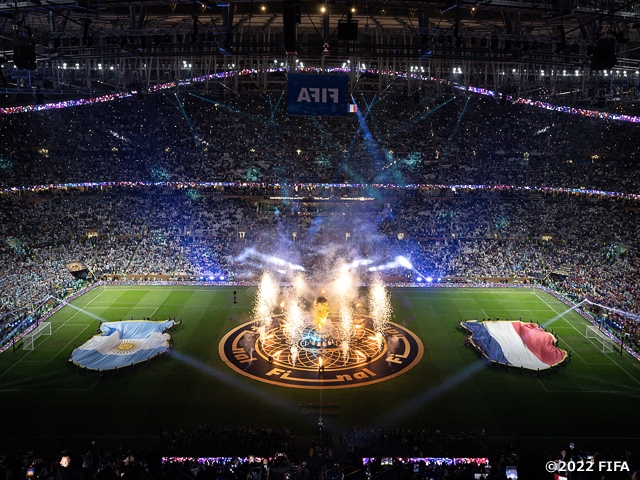
Related News
Latest News
-
National Teams
2026/02/12
U-17 Japan National Team squad & schedule - Prayer for Peace; Hiroshima International Youth Soccer Games 2025 (2/17-23@Hiroshima)

-
National Teams
2026/02/12
Nadeshiko Japan (Japan Women's National Team) squad & schedule - AFC Women's Asian Cup™ Australia 2026 (2/23-3/22)

-
National Teams
2026/02/09
U-16 Japan Women's National Team short-listed squad & schedule - Training Camp (2/16-19@Okayama)

-
Referees
2026/02/05
JFA launches "Development Group" in refereeing Mike Riley signed as Referee Development Director

-
National Teams
2026/02/04
U-16 Japan National Team squad & schedule - 4 Nations Tournament (2/9-19@Algarve, Portugal)














